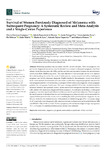Survival of women previously diagnosed of melanoma with subsequent pregnancy: a systematic review and meta-analysis and a single-center experience

Ver/
Use este enlace para citar
http://hdl.handle.net/2183/30697
A non ser que se indique outra cousa, a licenza do ítem descríbese como Creative Commons Attribution 4.0 International License (CC-BY 4.0)
Coleccións
- Investigación (FCS) [1293]
Metadatos
Mostrar o rexistro completo do ítemTítulo
Survival of women previously diagnosed of melanoma with subsequent pregnancy: a systematic review and meta-analysis and a single-center experienceAutor(es)
Data
2021-12-24Cita bibliográfica
Martínez-Campayo N, Paradela de la Morena S, Pértega-Díaz S, Iglesias Pena L, Vihinen P, Mattila K, Lens MB, Tejera-Vaquerizo A, Fonseca E. Survival of women previously diagnosed of melanoma with subsequent pregnancy: a systematic review and meta-analysis and a single-center experience. J Clin Med. 2021 Dec 24;11(1):83.
Resumo
[Abstract] Melanoma incidence has increased over the last few decades. How the prognosis of a previously diagnosed melanoma may be affected by a woman's subsequent pregnancy has been debated in the literature since the 1950s, and the outcomes are essential to women who are melanoma survivors in their childbearing years. The main objective of this systematic review is to improve the understanding of whether the course of melanoma in a woman may be altered by a subsequent pregnancy and to help clinicians' diagnosis. Eligible studies for the systematic review were clinical trials, observational cohort studies and case-control studies that compared prognosis outcomes for non-pregnant patients with melanoma, or pregnant before melanoma diagnosis, versus pregnant patients after a diagnosis of melanoma. The search strategy yielded 1101 articles, of which 4 met the inclusion criteria for the systematic review. All the studies were retrospective non-randomised cohorts with patients with melanomas diagnosed before pregnancy. According to our findings, a subsequent pregnancy was not a significant influence on the outcome of a previous melanoma. However, given the small number of identified studies and the heterogeneous data included, it is recommended to approach these patients with caution, and counselling should be given by known prognostic factors. We also reviewed the medical records of 84 patients of childbearing age (35.8 ± 6.3 years, range 21-45 years) who were diagnosed with cutaneous invasive melanoma in our hospital between 2008 and 2018 (N = 724). Of these, 11 (13.1%) had a pregnancy after melanoma diagnosis (age at pregnancy: 35.6 ± 6.3 years). No statistical differences in outcome were detected.
Palabras chave
Melanoma
Meta-analysis
Pregnancy
Prognosis
Survival
Systematic review
Meta-analysis
Pregnancy
Prognosis
Survival
Systematic review
Descrición
This article belongs to the Special Issue Cutaneous Melanoma: Current Diagnosis and Treatment Strategies
Versión do editor
Dereitos
Creative Commons Attribution 4.0 International License (CC-BY 4.0)
ISSN
2077-0383






